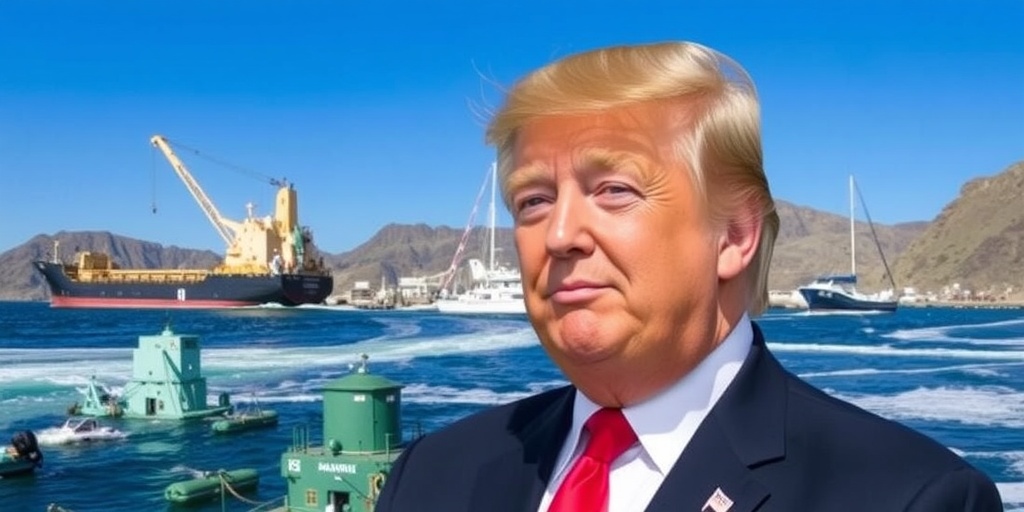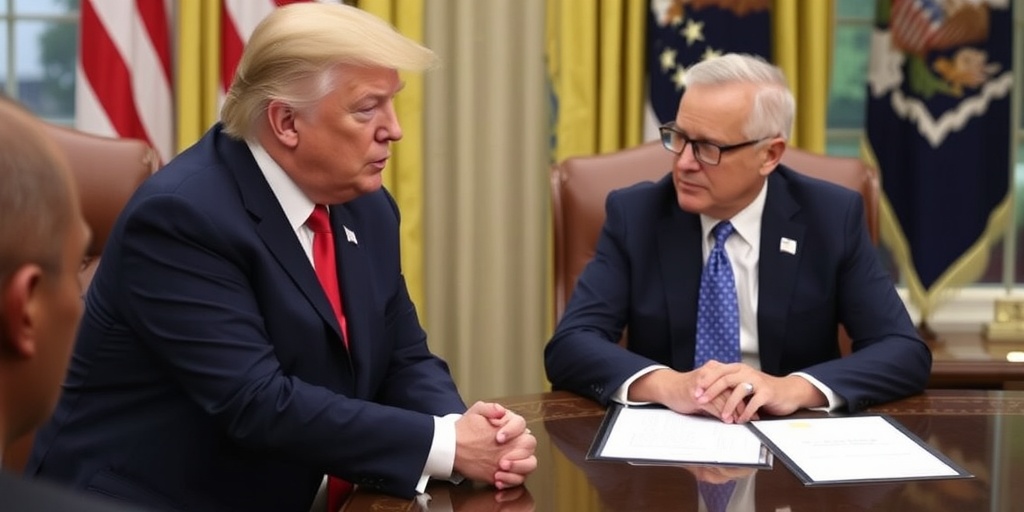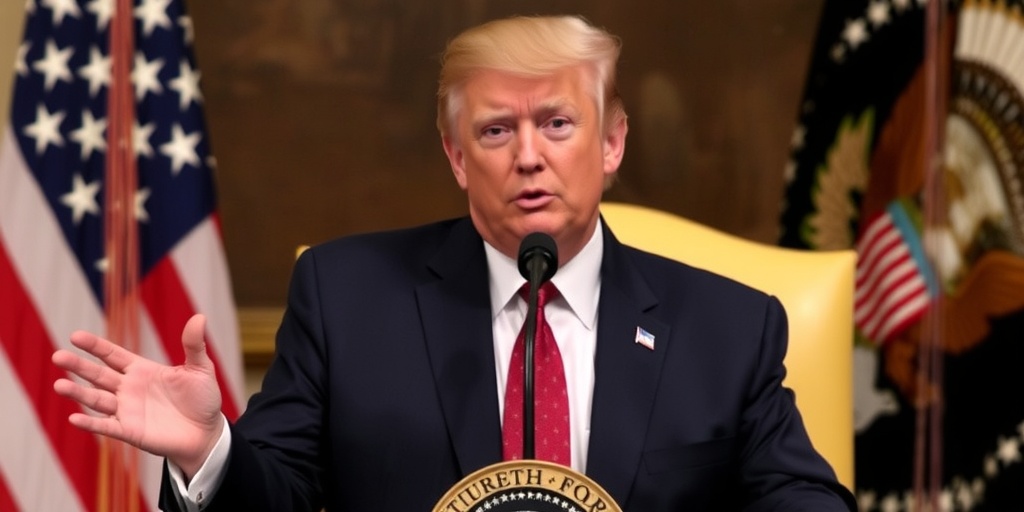Now Reading: Trump Administration’s Seabed Mining Shift Faces Global Backlash
-
01
Trump Administration’s Seabed Mining Shift Faces Global Backlash
Trump Administration’s Seabed Mining Shift Faces Global Backlash

Global Opposition Grows Against U.S. Seabed Mining Initiative Led by Wall Street-backed Company
A coalition of nearly 40 nations spanning the globe has expressed strong opposition to a controversial plan by The Metals Company, a mining firm backed by Wall Street, to partner with the Trump administration in an effort to bypass international law and commence seabed mining in the Pacific Ocean. The company seeks a U.S. permit to carry out these activities in international waters, igniting significant global backlash.
The response to this plan has been remarkable in its breadth, drawing together countries as diverse as China, Russia, India, the United Kingdom, New Zealand, Indonesia, France, Argentina, and Uganda, as well as smaller island nations like Mauritius and Fiji. This unity underscores a critical dispute over the governance of seabed mining beyond national jurisdictions, where the International Seabed Authority (ISA) holds regulatory authority under an international treaty.
On Thursday, The Metals Company announced its intentions to request approval from the Trump administration through a U.S.-based subsidiary to initiate mining operations in international waters. However, Leticia Carvalho, the Secretary-General of the ISA, underscored the illegality of such a unilateral action in a statement released on Friday. She emphasized that it would violate international law and the core principles of multilateral governance, jeopardizing the peaceful use of oceans.
Diplomatic representatives echoed Ms. Carvalho’s concerns, asserting that this unsolicited proposal endangers a collective global effort to equitably share in the valuable resources hidden beneath the seabed, which are increasingly crucial for industries such as electric vehicle manufacturing. Carl Grainger, representing Ireland, noted that the ISA holds exclusive authority to regulate the exploration and exploitation of mineral resources in these high seas areas.
The Metals Company’s frustration with the ISA stems from delays in establishing environmental and financial regulations necessary for commercial seabed mining permits. Gerard Barron, the company’s chairman, conveyed his eagerness to initiate mining operations as early as 2027, firmly believing in the United States’ right to independently issue permits in international waters. Barron contended that the freedom to mine the deep seabed is akin to the freedom of navigation, a privilege extended to all nations.
Responding to inquiries from the media, the Trump administration’s Commerce Department confirmed its disagreement with the ISA’s interpretation of international regulations. Maureen O’Leary, a spokeswoman for the department, referenced a 1980 federal law—the Deep Seabed Hard Mineral Resources Act—asserting that companies could indeed apply for exploration licenses and commercial recovery permits beyond national jurisdictions. This act has never been used for large-scale ocean mining, which adds a layer of complexity to these discussions.
The situation is further complicated by the fact that each nation controls its coastal regions, typically extending about 200 nautical miles from shore. Some countries, including Japan, Norway, and the Cook Islands, have contemplated allowing seabed mining within their territorial waters. Conversely, the United Nations Convention on the Law of the Sea, effective since 1994, bestowed the ISA with the power to regulate seabed mining activities in international waters, which make up nearly half of the Earth’s surface.
The Metals Company’s contract sites are situated roughly 1,000 miles off the coast of Mexico within an area known as the Clarion-Clipperton Zone. This seabed region is replete with polymetallic nodules containing valuable minerals such as nickel, manganese, copper, zinc, and cobalt. The company has already invested hundreds of millions of dollars into exploratory efforts in this zone. However, the lack of finalized regulations has strained the company’s finances and borrowing capabilities, heightening their urgency to commence mining operations.
Barron stated that he believes The Metals Company possesses enough expertise to manage environmental risks and plans to seek approval from the United States for mining in the aforementioned areas. Although the Law of the Sea has garnered ratification from over 165 nations, the United States remains a notable exception. Concerns dating back to the Reagan administration regarding mining provisions that could limit American companies’ operations contributed to this stalemate.
The Metals Company executives have reportedly engaged in confidential discussions with Trump administration officials to advance their mining agenda. In the past, President Trump has demonstrated an inclination to disregard international standards and agreements. His administration has previously proposed taking control of foreign territories to secure access to essential minerals necessary for U.S. manufacturing.
Barron contended that opposition to the project is largely fueled by environmental groups such as Greenpeace, which he claims see deep-sea mining as an “ultimate trophy.” Their continued efforts have allegedly delayed the establishment of regulations vital for the industry’s legitimacy. However, this claim has not sat well with the ISA and involved member states, as over 30 nations argue that the potential environmental impacts of seabed mining warrant further investigation before any commercial activities commence.
The potential grant of a license by the Trump administration to The Metals Company could catalyze a shift in global mining dynamics, flooding the market with essential metals while undermining the carefully laid plans of other nations contemplating seabed mining. As international tensions rise, officials from various countries have emphasized the need for collaboration and adherence to established international norms in navigating this critical moment in seabed governance.
Stay Informed With the Latest & Most Important News
Previous Post
Next Post
-
 01New technology breakthrough has everyone talking right now
01New technology breakthrough has everyone talking right now -
 02Unbelievable life hack everyone needs to try today
02Unbelievable life hack everyone needs to try today -
 03Fascinating discovery found buried deep beneath the ocean
03Fascinating discovery found buried deep beneath the ocean -
 04Man invents genius device that solves everyday problems
04Man invents genius device that solves everyday problems -
 05Shocking discovery that changes what we know forever
05Shocking discovery that changes what we know forever -
 06Internet goes wild over celebrity’s unexpected fashion choice
06Internet goes wild over celebrity’s unexpected fashion choice -
 07Rare animal sighting stuns scientists and wildlife lovers
07Rare animal sighting stuns scientists and wildlife lovers





















